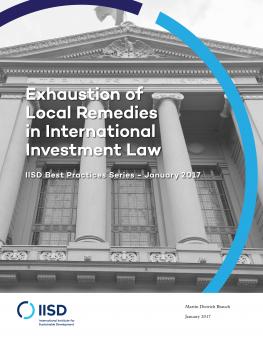
IISD Best Practices Series: Exhaustion of Local Remedies in International Investment Law
Part of IISD’s Best Practices Series, this advisory bulletin reviews state-of-the-art options and approaches to the exhaustion of local remedies requirement in international investment law.
The customary international law rule of exhaustion of local remedies (ELR) aims at safeguarding state sovereignty by requiring individuals to seek redress for any harm allegedly caused by a state within its domestic legal system before pursuing international proceedings against that state.
In international investment law, this rule has in large part been dispensed with, as states conclude investment treaties and chapters under which they give advance consent to international arbitration with foreign investors—a practice that was understood to mean that the investor could initiate a claim without prior recourse to the host state’s administrative or judicial courts. Even under treaties lacking an explicit or implicit waiver of the exhaustion rule, arbitral tribunals—ruling on their own jurisdiction—have generally allowed foreign investors to bypass local remedies.
In recent years, several states have reintroduced a mandatory requirement to pursue or exhaust local remedies for the settlement of investment disputes in their investment treaties. This practice is meant to empower domestic legal systems and avoid their bypassing. Other states are considering a similar path.
In this advisory bulletin, part of IISD’s Best Practices Series, we review state-of-the-art options and approaches to the ELR requirement in international investment law. Beginning with a background section, we define the scope of the paper, review the customary international law origins of the ELR rule and review how it was adapted to and developed in the context of international human rights law.Turning then to international investment law, we examine treaty practice and case law on requiring ELR before initiating international arbitration.Based on the lessons learned from treaty practice and jurisprudence, we conclude by outlining policy options for ELR in international investment law.
Additional downloads
You might also be interested in
IISD Best Practices Series: The Most-Favoured-Nation Clause in Investment Treaties
This IISD Best Practices paper studies the most-favoured-nation (MFN) clause in investment treaties and its interpretation by arbitral tribunals, drawing lessons for states.
IISD Best Practices Series: Performance Requirements in Investment Treaties
This paper surveys the types of performance requirements (PRs) in use around the world, and briefly describes the WTO’s Agreement on Trade-Related Investment Measures (TRIMs).
IISD Best Practices Series: State-State Dispute Settlement Clause in Investment Treaties
This paper looks at state–state dispute settlement provisions in international investment agreements, examining the different mechanisms used to settle investment disputes, including judicial, quasi-judicial and arbitration procedures.
IISD Best Practices: Compensation for Expropriation
This paper analyzes the principles governing compensation for expropriation, as well as the primary methods of calculating the amount.